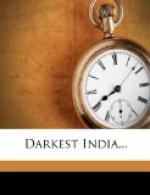“If, on examining this plan in the light of conscience, we see in it an augury for the removal of the deadly evils which lie at the heart of our civilisation, it seems to me we are bound to do our utmost to help it forward. ‘But,’ you say, ‘if we conscientiously disapprove of it?’ Then we are in duty bound to propose or to forward
SOMETHING BETTER.
“One way only is contemptible and accursed—that is, to make it a mere excuse for envy, malice and depreciation.
“He that heareth, let him hear; and he that forbeareth, let him forbear; but God shall be the judge between us, and His voice says in Scripture: ’If thou forbear to deliver them that are bound unto death, and those who are ready to be slain; if thou sayest, “Behold,” we knew it not, doth not He that pondereth the heart consider it, and he that keepeth thy soul, doth not He know it, and shall not He render to every man according to his work?’”
Archdeacon Sinclair wishes the scheme success.
Speaking at Bromley, Kent, on Friday night, in connection with the Canterbury diocese, of the Church of England Temperance Society, Archdeacon Sinclair referred to General Booth’s scheme. He wished very great success to that courageous and large scheme.
The Rev. Brooke Lambert defends the scheme in the “Times."
There is much that is not new in the scheme. General Booth allows that much. But there are two factors in his scheme which, if not new, at least acquire a new prominence. These two factors are help and hope. Society drops these two h’s. For help it substitutes money-giving, and as for hope for the disreputable, it has none. The personal contact of General Booth’s workers, of his 10,000 officers, is an essential feature of the scheme. They take the man or the woman as they enter the shelter, and prevent it from becoming a means of dissemination of crime, of filth, of disease. They stand by the new-fledged proselyte to work, to encourage perseverance. They follow him to the country colony, the abomination of desolation to one who has walked the London pavements and found his heaven in the gin-palace and the music-hall, to stimulate effort. They accompany him to the colony to remind him that true freedom is not licence, that the conditions of success are a change of mind




